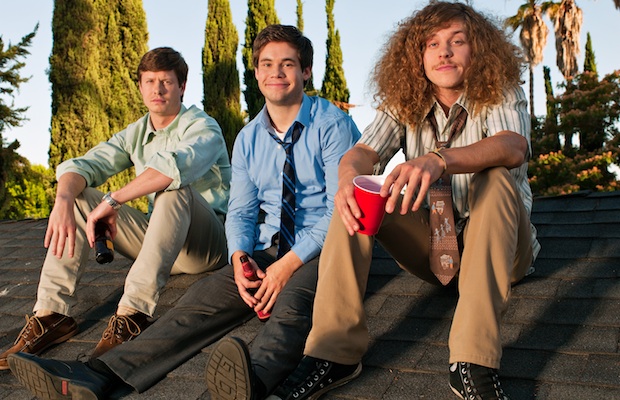

Currently in the midst of its third season, Workaholics airs on Wednesdays at 10 p.m. on Comedy Central. The raunchy 21-minute-long sitcom revolves around the lives of college dropouts who are having trouble adjusting to their newly adult lives. Blake Henderson (Blake Anderson), Adam DeMamp (Adam DeVine), and Anders “Ders” Holmvik (Anders Holm) form something of a family as they share a house in Rancho Cucamonga, California as well as a cubicle in TelAmeriCorp, a telemarketing company. Unaccustomed to real commitments and waking up before noon, the three men spend most of their days at work trying to figure out how they can avoid doing any work, and their nights smoking pot and drinking on their roof.
Workaholics has had great success thus far and has already been renewed for two more 13-episode seasons. The show started off as a web series produced by Henderson, DeVine and Holm as a part of their Internet sketch comedy group, Mail Order Comedy. Although they did not initially get much viewership, they forged on and continued to make videos until they experienced a great stroke of luck and caught the attention of Comedy Central executive Walter Newman. Says Anderson to web interviewer Ross Carey, “We weren’t getting many hits but we were persistent and we kept doing them and we liked them and we knew they were good…So, it was pretty awesome, we got lucky…there are a lot of great sketch groups out there that don’t have the luck we did.” After they presented Comedy Central with a pilot episode, they were signed for a 10-episode first season and have had great success with the show since.
It is difficult to imagine Workaholics airing on any network other than Comedy Central, as the raunchiness of the humor is often taken to extreme and sometimes unbelievable levels. “They’re letting us go wild, we’re actually surprised at how much they’re encouraging us,” Anderson said in his interview with Carey. “They want more dick jokes and we’re like, yes this is the perfect network for us.” The show’s focus on raunchiness was a detriment to earlier episodes, which seem disjointed and without substantive plots. However, deep into the third season, more nuanced plotlines have been developed that carry over from episode to episode to give Workaholics a more holistic feel. Anders has developed into the only character of the three with any responsibility, and he constantly struggles on his path to true adulthood as his friends, as well as his deep-seated lack of confidence in himself, try to keep him back. For Adam, the constant struggle stems from a deep yearning for the opposite sex coupled with a psychotic fear of them as he constantly tries and fails to woo “the ladies.” Out of the three, Blake has become the only one to be truly comfortable exactly where he is; as long as he’s with his friends and his friends are happy, he seems perfectly content with life…as long as there’s weed involved.
Although episodes of Workaholics have proven to be fast-paced and laugh-out-loud funny week in and week out, it has become clear that it is not judged in the same arena as more “mainstream” and perhaps “intelligent” comedies, such as 30 Rock, Modern Family, or even the darker Wilfred. Bodily humor abounds in Workaholics, but that shouldn’t mean that their specific type of comedy isn’t worth talking about seriously. Workaholics is more than the cheap humor that it appears to be at first glance. A real humanness is seen in this sitcom that is lacking in many shows these days — especially comedies. Adults are allowed to be unapologetically insecure, unmotivated, scared and even fans of Justin Bieber. Men are allowed to cry, women are allowed to be less-than-sexy and the effect of this humanity is refreshing. In a hipster age where it has become cool to partake in activities and to act a certain way not for the pleasure of it, but for the statement that it will make, a show that depicts guys goofing around un-ironically is valuable. They aren’t slackers because it’s “cool” to be laid back and disinterested; they’re slackers because they actually aren’t interested in the work that they do. The college life wasn’t for them, and neither are their livelihoods as telemarketers, and they never try to pretend otherwise. Genuine, and vulnerable because of it, the characters in Workaholics represent a new kind of raunchy humor — a kind founded in truth.